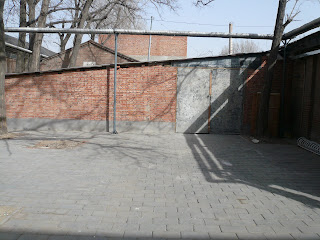
Hello wonderful friends and family!
Tonight was the first night of the weekly Tibetan dancing that happens on the school's beautiful, turf soccer fields. At the urging of a few present friends and teachers I hesitantly joined the expanding, twirling, snaking crowd. Unfortunately, I think whatever bits of circle, group, pattern dancing I've experienced over the years surfaced in an embarrassingly doe-see-doe type way tonight, while everyone around me swung their arms in naturally nonchalant, perfect cadence. I like to think maybe getting to laugh at me made someone's night.
Where progress in my Tibetan dancing is lacking, at least I can count on enormous forward movement with my Chinese. Yeah! I've been in classes for two weeks now and have definitely decided to stay in the higher division class with students from other international programs. This means I have four hours of Chinese every morning from eight to noon, each morning divided into two hour sessions of reading, listening, speaking, or comprehensive. It's taken a little time to figure out all the different sections and their corresponding teachers and books and assignments, but now I'm really starting to love it.
Let me elaborate. Here is our class. Four Korean girls, who fulfill any and all stereotypes that ever may have existed about Korean girls, but who I've really come to appreciate over our shared snacks and broken Chinese conversations. One older (fifties, sixties?) Korean man who speaks at every given opportunity in indecipherable tones and bewildering run-on sentences. The bulk of the class is six to nine (on any given day) Kazakh guys. Add a quiet, gangly Korean boy, a couple Mongolians, an Uzbek, and a brooding Russian given to sudden outbursts and arm-waving, and you've got our class. Oh! And an Italian girl who's 'wei's' and 'wo's' come out as 'vei's' and 'vo's'. Now, the socio-linguist in me wants to comment on which of these groups and individuals tend to know the most languages outside their native one. (Kazakh's and Mongol's--what can we determine about power and language acquiescence?) The feminist in me wants to comment on the obvious gender imbalance. (Hey Eastern Europe/Western Asia--where are your women?) But for now I'll try and stick to daily going-ons.
Class is conducted entirely in Chinese, not just as a teaching model, but because this is far and away the most universally spoken language between all of us. Collaboration, however, occurs in every available language. Kazakh is the background noise to any new vocabulary word I learn these days. Whispering conferences ensue immediately following a professor's misunderstood instructions, and conclusions are transfered from Kazakh to Russian when being yelled across the room. When I'm lost, my best bet for help is conveying my confusion in stumbling Spanish to a Kazakh who, coincidentally, speaks the language flawlessly. He may then turn to his counterparts for group decision-making, who may seek further assistance from the silent Uzbek or the sleepy Mongol. Meanwhile, the professor has asked a question about Korean public transportation, and the girls revert to their native tongue to decide whether the cost of taking the subway is the equivalent of three kuai or four kuai, while the older Korean explains to the distracted teacher that it's somewhere around six kuai. And in the crowded halls on breaks you can easily add another four languages to this mix.
As a sort of side note, I learned this week that Chinese Uighurs (living in the far northwest), Kazakhs, Kyrgyz, and Mongols can all communicate in a language native to the Steppes.
So, needless to say, the part of me that loves all the struggling and grappling and frustration involved in conveying your ideas and intentions in brand new ways is feeling plenty satisfied these days.
My classes in English are also going well. Three hours each Monday, Tuesday, and Wednesday afternoons are dedicated to a Sociology, Anthropology, or Religion class. We read and discuss and take field trips. Sort of your predictable standard, but all of our reading has been really valuable and relatively interesting. Our teachers are good and I think simply getting a greater sense of the many facets of historical and contemporary China is adding a lot more depth to how I can process this country.
Finally, Tuesday nights we have a two-hour Tibetan language class, taught by the wonderful Dekyi and by our program assistant Jabeh. We're working on the alphabet and introductions and all those unexciting, trustworthy fundamentals. The beginning stage of learning a new language always gives me that fluttery, nervous, excited feeling you get at the start of a new relationship. Seriously, I sit in class and take slow, diligent notes, hoping the language finds me a respectable partner. And you have no way of knowing where or how or if this new bond will become significant in your life! After class we all wander home in the cold dark, and Jabeh lets Dekyi ride his bike ahead, knowing she won't get too far without training wheels. Her front wheel dips and turns unpredictably. She gains a little speed pushing off the ground with her white high-tops, left than right, left than right. Last Tuesday we taught her the mechanics of breaking.
There's so much more I could say, still. About the deliciousness of egg and tomato omelets with rice, and the therapeutics of scrubbing my clothes clean, and the unembellished bigness of the national library. But there is plenty of time for all that later on.
I think about each of you going about your lives. Teaching, listening, waiting for sunshine, reading about Japan, writing papers, doing handstands, drinking tea, running, riding bikes, planting flowers, building lego ships, drawing, eating ice cream, wearing spandex, playing board games, making breakfast, snuggling, laughing. All these things make me happy.
Goodnight.
Love,
Makenzie























